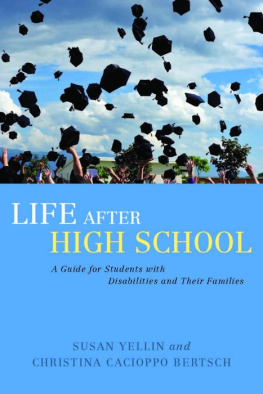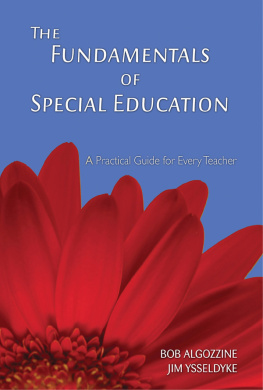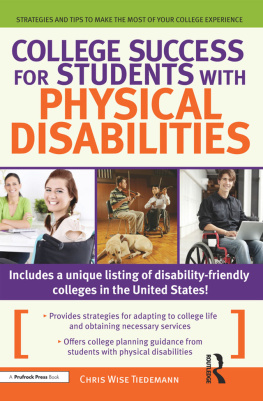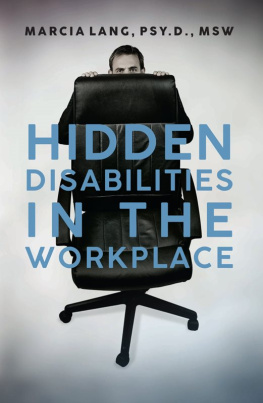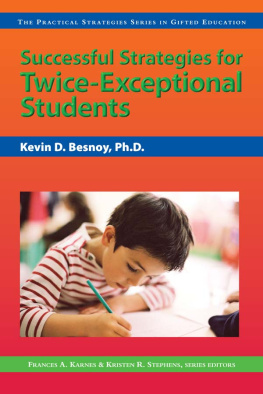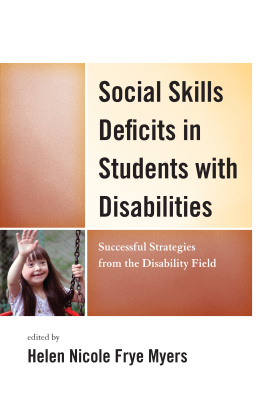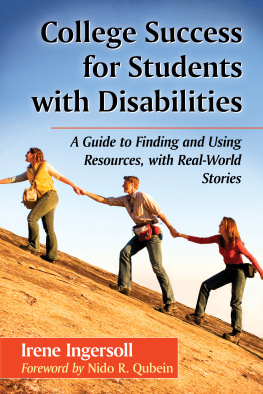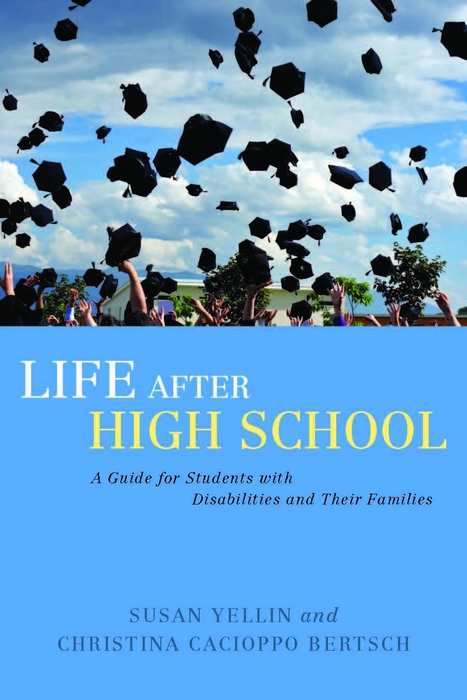Life After High School
A Guide for Students with Disabilities and Their Families
Susan Yellin and Christina Cacioppo Bertsch
Jessica Kingsley Publishers
London and Philadelphia
First published in 2010
by Jessica Kingsley Publishers
116 Pentonville Road
London N1 9JB, UK
and
400 Market Street, Suite 400
Philadelphia, PA 19106, USA
www.jkp.com
Copyright Susan Yellin and Christina Cacioppo Bertsch 2010
All rights reserved. No part of this publication may be reproduced in any material form (including photocopying or storing it in any medium by electronic means and whether or not transiently or incidentally to some other use of this publication) without the written permission of the copyright owner except in accordance with the provisions of the Copyright, Designs and Patents Act 1988 or under the terms of a licence issued by the Copyright Licensing Agency Ltd, Saffron House, 610 Kirby Street, London EC1N 8TS. Applications for the copyright owners written permission to reproduce any part of this publication should be addressed to the publisher.
Warning: The doing of an unauthorized act in relation to a copyright work may result in both a civil claim for damages and criminal prosecution.
Library of Congress Cataloging in Publication Data
Yellin, Susan.
Life after high school : a guide for students with disabilities and their
families / Susan Yellin and Christina Cacioppo Bertsch.
p. cm.
Includes bibliographical references and index.
ISBN 978-1-84905-828-5 (alk. paper)
1. People with disabilities--Vocational guidance. 2. Students with
disabilities--Vocational guidance. I. Bertsch, Christina Cacioppo. II. Title.
HV1568.5.Y45 2010
646.70087--dc22
2010004298
British Library Cataloguing in Publication Data
A CIP catalogue record for this book is available from the British Library
ISBN 978 1 84905 828 5
eISBN 978 0 85700 302 7
Converted to eBook by EasyEPUB
Dedicated to our families
Paul, David, Matthew, and Benjamin Yellin
and James, Sophia, and Audrey Bertsch
with thanks for your love and support
Acknowledgments
A number of people helped us bring this book to life and we want to take this opportunity to thank them.
We are particularly grateful to Jo Anne Simon, Esq., who lent her nationally recognized expertise in disability law and high-stakes testing to Chapters 1 and 5, and we are most appreciative for her insights, information, and editorial assistance with these chapters.
Dr. Paul Yellin, Susans husband, served as our medical consultant, and James Bertsch, Christinas husband, shared his knowledge as an educator and school administrator to give us a look into the real workings of high school guidance offices.
Our readers included Matthew and David Yellin, and Danielle and Maureen Cacioppo. David, particularly, assisted with technical editing and we are grateful for his expertise in legal citation format.
Christinas parents, Maureen and Paul Cacioppo, and Catherine Smith spent countless hours babysitting Christinas daughters, making it possible for Christina to actually sit down and write.
All of those who contributed their knowledge and assistance have made this book better. To the extent that if there are any errors or omissions, the fault is entirely ours, not theirs.
Our acknowledgments would not be complete without thanking the students and families who shared their stories with us. We hope that their experiences will help and inspire families and other students who are moving beyond high school to college, the workplace, and adulthood.
Introduction
If you are reading this book, you are probably a high school student with a disability, or the parent, counselor, or teacher of such a student. High school may be going well, or may be a constant struggle, but you have recognized that it will eventually come to an end and you have been thinking about what comes next and how to get there.
Weve written this book to help answer the many questions that students, families, and their advisors have asked us over the years. We hope that our experience can help you better understand students rights, responsibilities, and options as they move on to further education or the workplaceand help provide the tools they will need to succeed once they get there.
Our desks are piled high with books about attention deficit and learning disabilities, and we will certainly address these issues throughout this book. But we recognize that there are many other kinds of disabilitiesincluding physical, psychiatric, and neurologicalthat students and their families have dealt with throughout elementary and high school and that continue to be an issue as students move beyond the secondary level. And we are mindful that students are complex individuals, many of whom deal with more than one kind of disability, which our medical colleagues refer to as comorbidities.
We hope to give you a unique perspective on transitioning to life after high school. This multi-year journey begins no later than the beginning of high school and continues well into the early years of college, vocational training, or the workplace. Well set out what we believe to be the best time to start each step, but will help bring you up to speed if you havent started until later. We believe that the path to adulthood is a partnership between students and their parents, and we have tried to make this book relevant to both of you. Too many of the books we have encountered are highly academic or extremely simplistic. Its easier to take the necessary steps from dependence to adulthood, and from high school to college or the workplace, when all members of the family are literally on the same page.
We also know that each student and each family is different. For some students, high school has gone relatively smoothly with appropriate accommodations. For these students, college has always been a definite goal, and their academic performance has not been seriously diminished by their disability. For other students, whose disabilities are related to learning or attention, high school performance has been problematic, and even with an appropriate learning plan and accommodations, scores on standardized tests and grade point averages have been affected by their disability.
By looking at the transition process through the experiences of real students we have met and with whom we have worked, we hope to raise important issues and provide all of our readers with information they can apply to their own circumstances. As importantly, we aim to make this book a good reading experience. Buying this book and having it sit on a shelf unread is not going to be helpful to anyone. We believe that sharing stories, and avoiding lists and charts, will help make this an enjoyable read.
What qualifies us to write this book? Christina has worked with high school and college students and their families as both Director of Disability Services at Fordham University and as a college counselor to students with a wide range of disabilities. As the founder of CCB Educational Consulting Corp., she helps to identify supportive college settings and assist with standardized test accommodations, applications, and advocacy training to enable students to work successfully with colleges and professors. She has experienced the impact of a disability in a college setting first hand, watching her younger sister struggle with a disability and ultimately leave college without a degree. Christina is also the parent of two young daughters.

